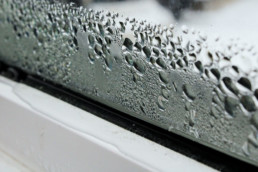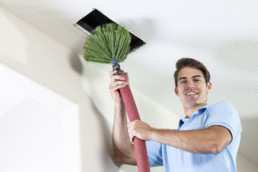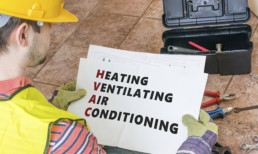Your Air Conditioner, Humidity and AC Drain Lines Explained
Your air conditioner--when working properly--draws moisture from the air and generates water as part of the condensation process. The water produced by the AC system typically runs out the back of the unit or drains into condensation pan attached to a drain line designed to channel the water to a safe area. If you don’t pay attention, water can collect inside the system or drip into areas of your home causing damage.
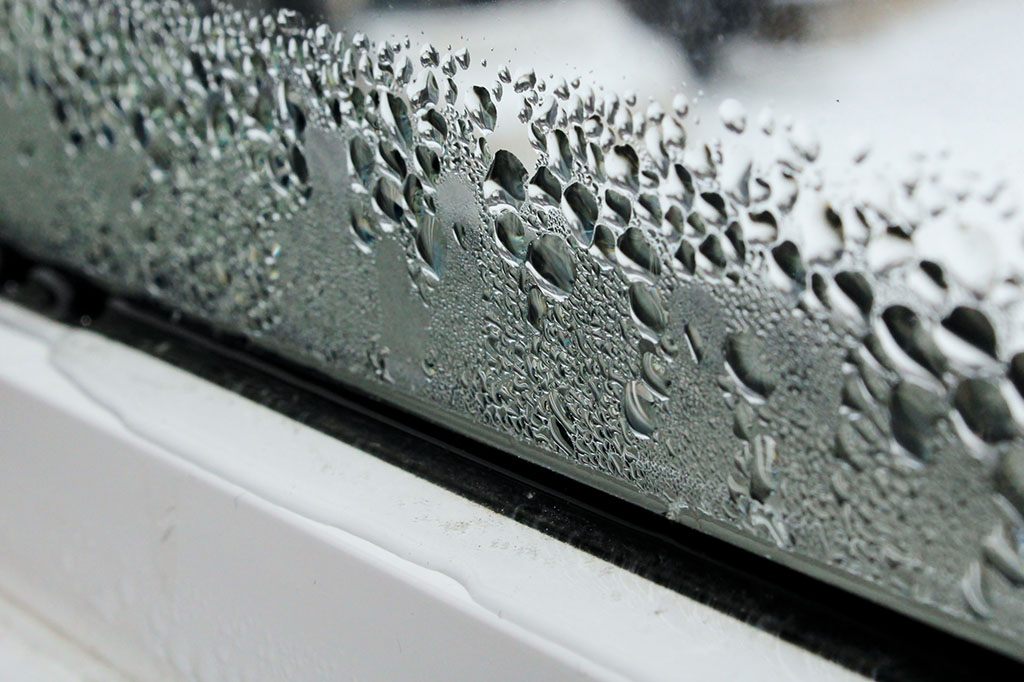
That’s why it’s important to understand how your system works, the effects of humidity and where your AC drain lines are located.
How AC Systems Work
HVAC systems generate water when cooling homes. AC units feature two sets of coils that continuously heat and cool the ambient air. The coils are connected by a condenser that rapidly heats and cools the air and evaporates and condenses water from the humidity in the air. Condensers use refrigerant chemicals to facilitate the cooling process. The refrigerant cools the coils, which cool air that flows over them. Moistures condense on the coils. Some water re-evaporates to provide additional cooling, but the process produces more moisture than can be handled. This water must be channeled out of the system. You’ve probably observed dripping window-AC units. All cooling systems must drain excess water, or problems will develop. The problems of excess moisture and clogged drain lines include:
- Water Blown by Internal Fans
If excess water gets blown back onto the coils, it can begin to ice over. That’s why many AC units “freeze up” and stop cooling properly. Many people understand that it’s sometimes necessary to turn off a unit to melt excess ice on the coils. You can speed the process by using a hairdryer to melt the ice faster. You should never try to chip off the ice because this can damage the coils. - Unsealed Units
Units that are improperly sealed--especially window units-- can allow warm, humid air to infiltrate the home. This puts more stress on cooling units, and the warm air can cause condensation on the outside of the units, which drips onto floors. - Clogged Drain Lines
Drain lines can get clogged from mold and algae growth, which dramatically affects AC performance. Clogged drains result in water overflowing the drain pans and damaging your home’s infrastructure and your AC system. Some systems have sensors that will turn off the systems when the AC drains get clogged. You can deal with a clogged drain by turning off the unit at the breaker and removing the condensation pan. If the pan is holding water, the drain is probably clogged. Dump the water, and clean and dry the pan. Use a shop vacuum to apply suction to the line to clear it. Once clear, pour distilled vinegar or hydrogen peroxide down the drain to dissolve any remaining growth. - Improper Sizing
If your unit isn’t big enough to handle your cooling needs, it will likely produce excessive water. One solution might be to use a dehumidifier. Dehumidifying the home has the added advantage of allowing you to set your AC to a higher temperature and remain comfortable. - Water Damage
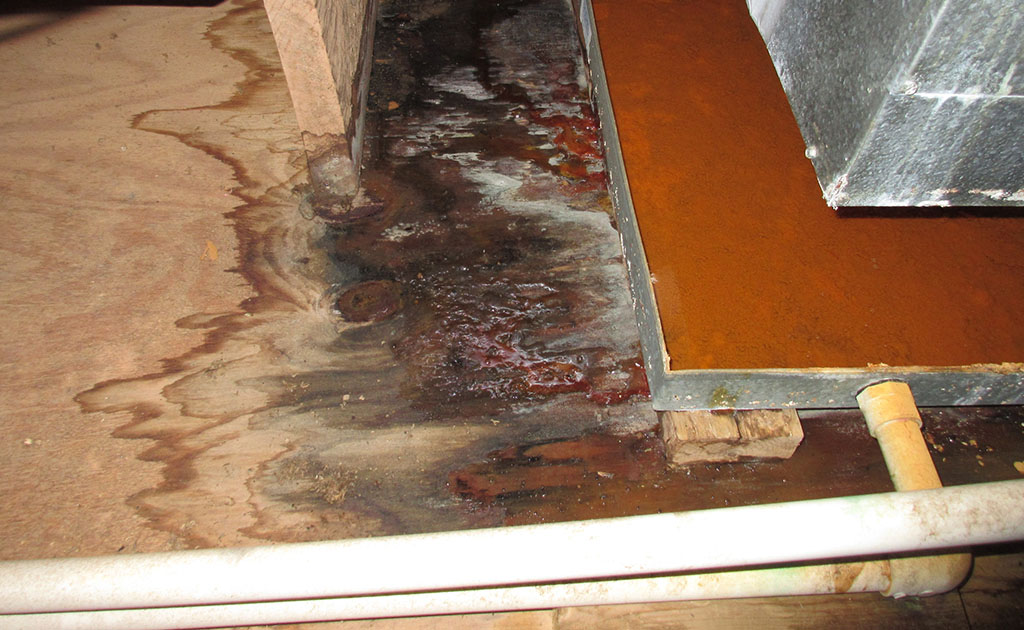
Excess water can damage all parts of your AC system. You might require parts or system replacement if the excess water isn’t addressed for a long time. Water intrusion from AC units can also damage your home and decrease AC efficiency.
Florida’s Heat and Humidity
In Venice and the surrounding areas of Florida, hot and humid weather is a year-round concern. Winter is more likely to be hot than cold, so residents worry more about humidity and comfort than heat. AC bills are big concerns, and keeping track of the water drainage of your cooling system is one of the best ways to keep bills lower and prevent problems.
Water Intrusion in AC Systems
Water intrusion in AC systems in Florida is a major issue, so residents should keep track of how well their systems drain any excess water. The growth of mold and mildew in hot, humid weather is a constant problem, but you can check your drain lines regularly to keep them clear. The first step is getting familiar with your AC system and learning where your drain line is and where it drains.
You can monitor your air conditioner and make minor repairs, but if your quick fixes don’t work, you might need professional HVAC service. Experienced technicians have the answers and tools to make your life in Venice, Florida more comfortable. Regular repairs and maintenance save money over time and create a better quality-of-life for you and your family. Call or text us at (941) 203-7955 for more information.
How Air Purifiers Can Help Improve Indoor Air Quality for Your Florida Home
If you are looking for a way to improve the air quality in your Florida home but don't know what solutions will help, you are likely wondering where to turn for answers. Enhancing your air's quality provides you with a range of excellent benefits you will not want to miss.

But doing so is not always easy unless you have a proven plan at the top of your mind. The right air filter from a reputable HVAC company can do wonders for the air in your home and allow you to reach your goals without much trouble, and you will soon discover the advantages you can get by using the right one for your home and situation. The outcome you achieve will make you smile because it lets you know you have made the smart move.
Control Dust
Dust in the air is a common problem people want to solve when they buy air filters for their homes. Some dust particles are large enough for you to see, but others are so small that they are invisible. Your body can handle small amounts of dust without any problems if you are in good shape and take care of yourself.
If you are sick or encounter large concentrations of dust in the air, the problem is a little more serious and can cause several symptoms you want to avoid. Sneezing, coughing and eye irritation are just a few of the issues dust can cause if nobody does something to stop it. Contacting a heating, ventilating, and air conditioning company to get air purifiers is a great solution that will handle the threat and give you peace of mind.
Reduce Allergies
Those who suffer from seasonal allergies go to great lengths to get the problem under control so that they can manage the symptoms. They often take over-the-counter medicines and visit their doctors with hopes of ending their allergies and combating the symptoms for good. Allergies can range from minor to severe depending on you and your environment.
A reputable HVAC company can come to your home and install filters that will reduce or eliminate pollen and other things in the air that contribute to your allergies. Breathing easy is what you will do once you take action and install high-quality filters in your home. Your allergies will then become a thing of the past, and you will be pleased with the results.
Remove Household Odors
Many people struggle with a range of household odors but don't know how to address the problem so that they can contain it. They often spray air fresheners to do the trick and remove the odors, but that option only covers the smell. An air filter, on the other hand, will remove the particles that cause the odor from the air to prevent you from inhaling them. Even though household odors can remain after you clean the source if you are not careful, a good air filter will do the job right.
Eliminate Harmful Chemicals
Harmful chemicals can build up in the air and cause you to experience problems before you notice the red flags. If you spill chemicals or cleaners in your home, they can leave harmful traces in the air that will affect your health over time.
Also, some pesticides that companies spray in towns and neighborhoods can get into your home and do damage unless you take steps to stop it. Put air filters in your home if you want to keep yourself and your family out of harm's way.
Reduce Mold Spores
Many people have mold in and around their homes but are not aware of it, and the mold can grow and become even worse as a result. You could check your home for mold but still miss a few spots even if you are careful, leaving harmful spores behind. Having mold in your home can cause symptoms similar to allergies, but those who have allergic reactions can face even worse health risks. Contain stubborn mold spores and put your worries to rest with the right air filters for your needs.
Final Thoughts
If you are not happy with the air quality in your home and want to do something about it, you are at the perfect place. Our team can come to your location and install some of the top air filters on the market.
We offer a range of fantastic options from some of the top HVAC companies in the nation, including Bryant. Our dedication to quality and commitment to making each client happy is the foundation of our long-term success. Many people turn to us when they need to improve their air quality, and you will see why if you give us a chance. Our team is standing by the phone to take your call and meet your needs
Call or Text (941) 203-7955.
Dealing With Mold In Your Air Ducts and HVAC System
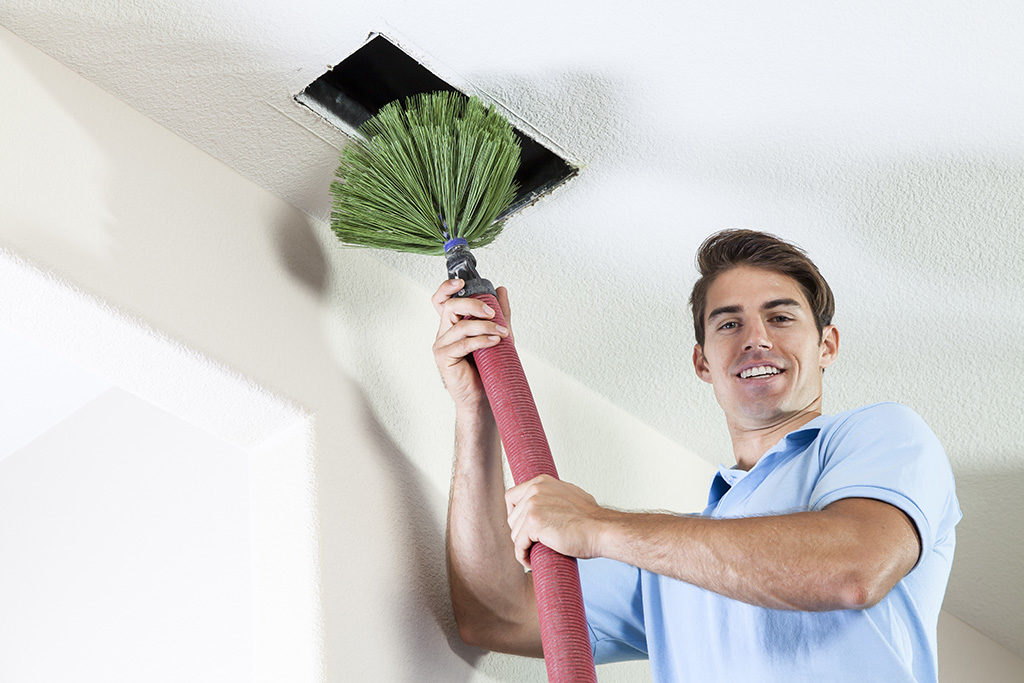
Living in a hot, humid environment certainly has many advantages. You get to enjoy the outdoors all year, you can grow plants that would die in colder conditions and it’s always a good time to hit the beach. One of the disadvantages of living in a climate like this is that these conditions are exactly right for the rampant growth of mold. Unless you take proper precautions, you may end up with mold throughout your HVAC system. This causes many problems with the value of your home and the health of you, your family and your pets. If you suspect that you have a mold problem in your air ducts, read on to find out what you should do about it.
How to Identify a Problem
You may only suspect that your air conditioner is a super highway for mold spores right now. There are a few telltale signs you can look for to confirm your suspicions before you take additional action. Examine the drywall in your home. Pay special attention to the ceilings and areas around crown molding in rooms where high humidity is common, like the bathroom and kitchen. If you see patches of grey or green, that means you have a mold problem. The spores likely incubated in your HVAC system and were transported into your home through your forced air system.
Another telltale sign that you have a mold problem is a persistent musty smell. Any odor that reminds you of an old basement is likely caused by the presence of mold. If you notice the smell more strongly every time your air conditioner comes on, the source of the mold is almost certainly in your HVAC system.
What Causes Mold
In the humid climate of Florida it is not hard for mold spores to find a place with accumulated moisture in your air ducts. Mold does not need light to grow. It only requires enough moisture and a source of food to quickly reproduce to astonishing levels. When you turn on the air, the temperature difference can cause condensation to collect on the air ducts. If you rarely have air duct cleaning done, dust, dead bugs, and pollen all settle into the ducts. These are organic materials that make the perfect mold food.
Once the mold has begun to grow in your system, the constant blasts of air through the ducts carry the spores, essentially mold seeds, through your ducts where they can settle and grow new areas of mold. These spores make their way into your home by entering through the vents.
How This Affects You
The main reason you should care that mold is growing in your home is not due to concern for the aesthetic appearance of any drywall the mold may invade. An abundance of mold causes serious health problems for all those that live in the house. Anyone prone to allergies and asthma will be the first to notice the hazards.
Coughing, sneezing, watery eyes, itchy nose and constricted breathing are the first signs that your mold is out of control. Children and adults with lowered immune systems may also notice angry, red rashes on their skin. You will begin to feel tired all the time even after a full night of sleep. Dizziness, nausea and shortness of breath are also common. These symptoms will be present in both humans and pets. Mold spores in the air are dangerous for those with asthma as it can trigger an attack.
What Testing Involves
Now that you know the dangers of a mold infestation, you may wonder what you can do about it. To confirm that you have mold, you will need a professional from an HVAC company come to your home to test your system. They will take samples to determine the type of mold and how much of it you have. From there, they can make recommendations on how best to fix the problem.
Fixing the Problem
Once the presence of mold is confirmed in your system, you should take immediate steps to stop the further spread of the spores. Begin by turning off your air conditioner. This will halt the movement of spores for the time. You then need to replace all filters and insulation that are essentially spore sponges. All hard surfaces, including the inside and outside of ducts, vents and coils, need to be cleaned with a chemical approved for removing mold from ductwork.
Missing even one step can quickly lead to a recurrence of mold growth. Mold is able to grow incredibly fast under the right conditions. The best way to ensure the mold is completely removed is to hire a professional from an HVAC company. They have the skills and knowledge to completely eliminate the growth with chemicals that can be harsh to work with for those with respiratory problems.
How to Prevent Future Problems
Once your HVAC system is mold free, keeping it that way requires precautions. Removing potential sources of food and water is the best way to ensure you never have to deal with mold again. A regular air duct cleaning and changing your filters remove the organic materials necessary for mold growth from your system. Prevent excess moisture by investing in a dehumidifier, constantly cleaning drip pans and insulating your ducts to prevent condensation from collecting. Without these sources of moisture, the mold cannot thrive.
With any home problem as persistent as mold, leaving this tricky job to professionals is your best course. Follow these steps and you can maintain an mold free home even in this moist climate.
More Than Temperature, Air Conditioners Control Indoor Humidity

Homes and Indoor Humidity Concerns
Air conditioning systems handle more than you may think. They don't just manage temperatures inside. They also take care of indoor humidity levels, interestingly enough. If you want to understand the ins and outs of your air conditioning system, this information can help you significantly. Air conditioners have the ability to extract significant amounts of moisture from the air. That can sometimes have unpleasant consequences, too. This humidity removal can increase drain pipe pressure considerably. That, in turn, can force air conditioning systems to turn off on their own. If you own an air conditioning system that has been mysteriously turning off all by itself lately, inordinate humidity could be the big, bad and unsuspecting culprit.
Air conditioning units operate in relatively simple and straightforward styles. They cool living spaces by extracting moisture and heat that exists in the air. High humidity makes these systems have to exert themselves more. If your air conditioning system isn't in tiptop shape, it may have trouble with the increased demand. This is usually a big problem for air conditioning units that have inadequate cooling capacities. If your home environment always seems a little "off" and is never perfect and "just right," a problematic cooling unit could be to blame.
People should always be attentive to indications of immoderate humidity indoors. If the air in your home always feels oddly damp and wet, its humidity levels could be too high. People who live in particularly humid settings may even discover issues with their skin. If you skin always is sticky and sweaty to the touch when you're at home, you should pay closer attention.
It can also help to take at look at the windows that are in your residence. Windows can often be extremely telling. Do your windows always look oddly hazy and misty? If they do, high humidity could be the reason. Humidity, in short, is vaporized H20 that lingers in the air. It can accumulate and take on a conspicuously cloudy appearance.
It's also important to focus on any bizarre smells throughout your property. If you detect any stale and moldy odors, it's probably time to assess your humidity levels. Immoderate amounts of humidity can frequently trigger moistness in properties. This moistness can bring on smells that are less than inviting, fresh and clean.
If high humidity is a problem in your home, that's no reason to feel panic. You don't have to compromise, either. Cooling your residence properly doesn't mean that you have to live a lifetime of uncomfortable humidity. Professional dehumidifier installation can save the day. Dehumidifiers are devices that can do wonders for HVAC (Heating, Ventilation and Air Conditioning) systems and properties in general. They can remove moisture in the air successfully. They can do this before the moisture gets the opportunity to make its way out from ducts.
People who have air conditioner and humidity concerns can take it easy once and for all. The assistance of a reliable and efficient dehumidifer can be priceless. It's important to understand, however, that good timing is critical. If you want to feel great in your home, you should take care of all humidity concerns before the hot summer weather starts. People should usually aim for humidity levels that are less than 60 percent. This level of humidity can be optimal for relaxation. No one wants to sweat and feel hot and stuffy all day at home.
If you're on the lookout for first-rate professional dehumidifier installation service, you can reach out to our trusted local company without a second of delay. We're a full-service HVAC business that's located in bright and beautiful Venice, Florida. Our technicians are trained, motivated and knowledgeable air conditioner experts. They're HVAC experts in general. They can help you take care of a vast array of service requests. People who need dependable and comprehensive air conditioning repair in Venice can lean on our staff. People who need high-quality furnace installation, repair and maintenance work can do so, too. Some examples of the other top-notch services that are available through our firm are zoning system assistance, boiler replacement, boiler repair and mini-split system assistance. It's not an overemphasis to say that we can do everything for you.
Our company focuses on strong customer service. We also focus on exceptional customer satisfaction. If you're tired of tolerating unpleasant humidity in your home, we want to help you out. If you're fed up with your airless and stale home environment, we want to help you out, too. Home comfort is our top passion here. It's what drives us to do exemplary work on a daily basis. People who are in need of outstanding professional dehumidifier installation in Venice can get in contact with our company any time. People who need air conditioner service can, too. Contact us today to request a free quote.
Air Conditioners Remove Humidity, But In Florida That Can Mean A Lot Of Water
Although this time of year is cooler even for Florida, there's a good reason why Florida is designated a "humid subtropical climate". Warm days go on into the dead of winter, and the humidity never seems to end. When the warm days continue and the humidity rises, people will turn on their air conditioners to get some relief from both. The level of interior humidity can affect mood as well as comfort. Our bodies cool themselves through evaporation of moisture, and humidity in the air impairs that process.

One of the functions of air conditioning is to remove moisture from the air. This process can inflict some degradation of performance on you AC over time. This will affect the overall efficiency of your HVAC systems in cold as well as hot weather. Here you'll find some of the problems in maintaining humidity levels, along with solutions that can help you sustain a comfortable home year-round.
Central Air Conditioning and Humidity
When AC systems are working properly, they will remove the right amount of moisture from your interior spaces along with heat. Modern AC units are designed to maintain a comfortable environment in both ways. However, if your system is not working as it should, it may struggle to keep a comfortable interior climate, no matter how far you turn down the thermostat.
AC systems that are older, improperly installed or maintained, or incorrectly sized for the volume of space they must cool, won't perform well. When you feel hotter, you tend to turn up the AC even more. The system will work harder; that drives up your energy bills and puts more stress on the equipment without solving the problem.
However, upgrading to a larger and more powerful air conditioner won't necessarily solve your humidity problems. It will consume more electricity. You should consult with an HVAC professional on the properly sized units for your home. If you AC system isn't currently able to provide you the level of comfort you want, you may very well have a problem with it's ability to remove moisture from the air flowing through it. The more obvious signs that this is case include:
1. A damp or musty smell in all or parts of your home.
2. The windows fog up.
3. You can feel the moisture in the air.
You should then take action to ensure the system is working properly.
How to Dehumidify
Now may be a good time to get the HVAC serviced before the problem is exacerbated by the hot Florida summer. In the peak of the Florida heat, it's recommended that residents have AC systems that will keep moisture levels below 60 percent.
In some cases a professional HVAC tech can install a dehumidifier into your existing HVAC. This will assist your air conditioner in removing humidity so that it doesn't find its way into duct systems or walls. Trained professionals will know the right unit for the best effect. Even if you're having a new or upgraded system installed, ask about the advantages of installing a dehumidifier to run during the humid summer.
Another good option is to purchase a portable unit than can plug in and operate wherever you wish to remove moisture from the room. The dehumidifier you pick should have a humidity indicator which you have to check often, as well as periodically emptying the drip pan where the removed moisture collects. But it can be an easy way to make a room more comfortable on a hot day. It will definitely help out your AC and remove some of the other problems of excess moisture, like moldy smells or fogging windows.
Maintaining Outdoor HVAC Systems
The heat and humidity will also take a toll on outdoor units. Moist, heavy air, especially in Florida, is likely to contain dust, pollen, molds, or algae that can settle on outdoor equipment and accumulate there into an unpleasant film. It can also collect into AC coils, screens, and cooling fins. In the summer, many Florida residents will leave their AC units running 24 hours a day, for days on end. This also puts a strain on your AC system.
Regularly cleaning the unit with a garden hose can help to reduce this. There are also commercial products specially made for cleaning air conditioner coils. Cleaning helps to sustain more efficient operation so that your AC unit works better and saves electricity. An occasional misting of water on the unit itself will also help to cool it in hot weather so that it can absorb more heat from inside the home.
Your comfort in your own home is important, but keeping you AC at optimal levels is especially important on muggy Florida days when the system is working at its hardest.
Five Ways to Improve Indoor Air Quality
People underestimate the importance of indoor air quality and the impact that it can have on their health and well-being. Poor air quality can aggravate allergies, asthma, and other respiratory problems, while clean air can make those problems much easier to tolerate. Maintaining the air quality in a home is relatively easy, and all the average person needs to do is to change a few habits that contribute to the problem and adopt one or two solutions to help clean up the air.

Prevent Problems
An ounce of prevention is worth a pound of cure. That's just as true when dealing with indoor air quality as it is when dealing with disease. Most of the factors that contribute to poor air quality in the home are easy to prevent with just a little bit of effort, so there's no reason not to take a few moments to make sure the problem doesn't get worse.
It's best to start by removing sources of pollution from the home. Paint, pesticides, and cleaning solutions can all pollute the air, so it's best to keep them in tightly sealed containers to minimize the damage. Keep them in a well-ventilated area to make sure that the pollutants don't build up, and try to use as few of them as possible.
Mold is another major source of contamination. It grows in moist areas, so simply cleaning up condensation and managing a home's humidity can prevent the worst of the problems. It's also important to clean air ducts and other areas that are havens for mold growth. Homeowners can do this on their own in most cases, but there are times when help from an HVAC company is necessary to access an infestation.
Mechanical Purification
Plants aren't the only option for people who want an air purifier. Machines may not be as pretty as plants, but they can pack a lot more power into a lot less space. There are a few different options to choose from, and almost every HVAC company is capable of helping customers pick out the right model.
The biggest choice is between an air purification system that covers the whole house, or one that works in a single room. The smaller options are best for homes that get most of their contamination from a single room, like a painter's workshop. These can be useful supplementary systems in those rooms even when other systems take care of the rest of the building. Larger air purifiers are better for homes that are prone to mold infestations and have other sources of contamination spread all over the house.
In either case, it's important to take the time to maintain the system. Air purifiers need to have their filters changed regularly, although the precise frequency will vary depending on the model and how much work it does. A purifier that doesn't get maintained won't be able to do its job, so these systems are best for people who are willing to check on them regularly. The best way to make sure that it remains as reliable as possible to choose one from a manufacturer that has a reputation for quality, such as Bryant. The best purifiers require the least maintenance to stay in good condition, so this saves time and money on maintenance while also ensuring that the machine starts out strong.
Go Green
A plant is a natural air purifier. Most people realize that plants take carbon dioxide out of the air when they photosynthesize, but they also help to remove contaminants. A single plant won't do much, but a small group of them can make sure that the air in a room stays reasonably clean.
There are a few different ways to take advantage of the purifying power of plants. Planting them outside can improve the quality of air the enters the home, especially in cities and other polluted areas, but that only helps when it is combined with good ventilation. The best results come from bringing plants inside the building. Any plant will help, but plants with lots of leaves will do better than most of the alternatives.
The easiest way to find space for those indoor plants is to set up planters on window sills. They aren't likely to cause an obstruction, and they can get all the light that they need. Hanging baskets are another option for people who need more space. It's safe to use these plants to grow food in all but the most polluted areas, so this is also an excellent opportunity to grow food crops, such as lettuce, in the home.
Ventilate the Building
Outdoor air is almost always cleaner than the air inside a building. There are exceptions to this rule, such as the air at construction sites, but it's valid in most areas. That means that homeowners can often improve their indoor air quality by allowing the air to circulate between their home and the environment.
The easiest way to do this is to keep windows open when the weather is good. That can have a major impact on the home's air quality on its own, but there are times when it isn't quite good enough. A good fan system can amplify the effect, and even something as simple as putting a fan in the window can help.
The best results come from improving the ventilation in the home's cooling systems. Most air conditioners work by circulating the air that is already inside the home, but there are also systems that move outdoor air into the home. These systems have a lot of power, so they can do more to ventilate the home than most of the alternatives.
Mixing and Matching
The real secret to having clean air is using all of the methods at once. Every home can benefit from some preventing pollution before it starts, even a home that already has a strong ventilation system. Nothing stops a person from combining a small indoor garden with a mechanical air purifier. Each individual method has its own limits, but combining them can surpass those limits.
That may seem like a lot of effort, but it's work that can pay dividends over time. Most of these methods only need a little bit of maintenance once they get started, so even a single day's work can give a family healthier lungs for years to come. People who need help with the process can contact their local HVAC company to find out how to improve their ventilation and air purification systems.
Indoor Air Quality Starts With Your Air Conditioner
Indoor air quality can have a significant impact on a family's health. Pollutants can aggravate allergies and asthma, and they can even encourage respiratory diseases to develop. The home's air conditioner is one of the most important factors for determining the local air quality, so every homeowner should keep an eye on it and call a reliable HVAC company if any problems appear. It isn't always easy to find those problems, but there are a few things that anyone can notice if they keep their eyes peeled.

Clean the Filter
Most air conditioners function by circulating air through the system and back into the home. That gives the air a chance to pick up dust, spores, and other pollutants, so most units also include filters to clean the air as it circulates. Those filters normally work quite well, but they need to be replaced every so often to prevent them from getting clogged and useless. It's hard to predict how often this needs to be done, since it will vary depending on the quality of the air that passes through those filters. The best way to avoid problems is to check the filters at regular intervals and to clean or replace them whenever they look dirty. In most cases, that will be once every two weeks or so, but it's important to check the filters instead of relying on a guideline.
Check the Ducts
The filters aren't the only place where pollutants can build up and cause problems. They can also accumulate in the air ducts, which can spread the problem all over the home. Mold is the largest problem in these cases, since the air ducts are often a moist environment where it can survive for a long time. As the mold survives, it will release spores in order to spread, and those spores can cause respiratory problems in humans.
It usually isn't easy or necessary for families to clean their air ducts on their own. It's usually best to call an HVAC company to prevent damage to the system. It's a good idea to clean them regularly to be safe, but it's only necessary when there is visible mold or dust building up in the ducts or when people are having respiratory problems and can't identify the cause.
Fresh Air Helps
Keeping the AC system clean can prevent most problems, but indoor air quality will still degrade over time in most homes. The easiest way to prevent that is to open up the windows and let some fresh air into the house. That will help to get rid of any contamination that the filters couldn't handle on their own. Try to do this when the outdoor air is at its cleanest. That means avoiding times when people are spraying pesticides, doing construction work nearby, or doing anything else that could lower the quality of air in the area.
Preventing Problems
Always remember that it's better to prevent problems that to deal with them after the fact. If something happens that could cause problems with the AC unit, it's better to get some preventative maintenance than it is to wait until people get sick. It's best to clean filters more often when people are spraying chemicals or working indoors. Moisture encourages mold to grow, so homeowners should watch their air ducts during periods of high humidity. When it looks like there might be a problem, play it safe and call an HVAC company for help to prevent medical issues from developing.
Why Does it Matter?
That may seem like a lot of effort, but indoor air quality is a major health concern. Poor air quality can aggravate most respiratory problems, and in the long run exposure to polluted air lowers life span and leads to trouble breathing. Children are especially vulnerable, and the damage can last a lifetime. It's much easier and more pleasant to prevent those problems by cleaning a few ducts and filters than it is to treat the diseases for years to come.
Types Of Air Purifiers for Your Home

Air purifiers are convenient household devices that, as their names suggest, purify and cleanse the air. They accomplish this by extracting contaminants from out of the air. Air purifiers can be helpful to all people but are often considered to be especially positive for those who have asthma or those who have allergies. If you're thinking about purchasing an air purifier for your residence, you should review all of the options that are available to you. You can also contact our reputable family-run HVAC company for more information. Our Venice-based business has NATE certification and also is a Bryant dealer with factory authorization. When it comes to air purifiers, we truly know our stuff.
There are numerous options are effective whole-house filters.
Pleated filters are one option. These types of filters are adept at obstructing microscopic particles that are particularly harmful to the lung tissue. If this sounds interesting to you, look for a pleated filter that's electrostatically charged. These kinds of pleated filters are terrific for drawing in typical allergens such as pet dander and pollen. Although these filters sometimes cost a bit more than others, they're generally totally worth the extra money.
Ultraviolet filters are also available. These whole-house filters are a smart option for those who are generally most concerned about the presence of germs. Ultraviolet light is capable of destroying airborne viruses and bacteria. As a result, UV filters are particularly common sights in medical facilities such as hospitals. If you ever happen to visit the tuberculosis section of a hospital, you'll likely see an ultraviolet air filter there.
Electronic filters are yet another strong option in whole-house filters. Another common name for the electronic filter is "electrostatic precipitator." These filters are often integrated into ductwork. When air travels within these filters, single high-voltage currents place electrical charges on the particles. Collector plates with opposite charges then retrieve the particles. These collector plates are situated on the units' other sides. These types of filters are particularly useful for tiny smoke particles. When smoke particles are excessively tiny and therefore cannot be caught inside of media filters, electronic filters are a good idea. These filters differ from media filters in that they don't call for replacements ever. It is important, however, for people who have electronic filters to clean their aluminum collector plates several times a year. These collector plates require cleaning with soapy H20.
Extended media filters, last but not least, are yet another choice in whole-house filters. These filters are shaped like boxes. They consist of filtration media heaps that, as a result, enable them to be stronger and more successful than standard fiberglass filters. If you want to invest in an extended media filter for your residence, you have to get it professionally installed. Extended media filters require annual replacement.
Since maintaining clean air in the home is such an important thing, it's crucial for homeowners to take the process of selecting a whole-house filter extremely seriously. Your goal should be to invest in a whole-house filter that's capable of efficiently retrieving pollen and dust, for example.
As far as the subject of air purification goes, no other company in the Venice, Florida area can assist you better than we can. If you have any questions or concerns regarding air purifiers and whole-house filters, for example, we can provide you with all of the information you could ever possibly need.
Since we're equipped with NATE certification, customers can trust our expertise 100 percent. NATE refers to the HVAC (heating, ventilating, and air conditioning) technician certification standard. The talented technicians who work for our company have the skills and knowledge necessary to provide our customers with the finest HVAC service around, zero exceptions.
If you need assistance with air purification, our company can be a great asset in your life. Our customers can back up our reliability, as well. Just read all of the glowing reviews we get on a regular basis. As soon as you realize that you need assistance with your air filtration system, let our company know. We can offer you dependable and trustworthy suggestions that can get you on the right path. Contact our company as soon as possible to make an appointment with us. Call or Text us today for more details (941) 203-7955 and don't forget to check out our specials, financing, and rent-to-own air conditioning options. Stay Cool with Mahle!
Keep Good Health Indoors By Maintaining Your Air Conditioner
The air in your home can be hazardous to your health. That's because many people do not take the time to properly maintain their air conditioning system. Your air conditioning system is designed to clean and circulate the air in your home.

However, the system must be cleaned and serviced regularly or the air in your home could become toxic. This can be particularly serious for people with health problems. It can also sicken healthy people as well.
The Problem
The air in your home contains dust mites, dead skin cells, and other irritants. When your air conditioning system is functioning properly, it filters those things out of the air and pumps clean air back into your home. However, in order for the system to work as it should, the air filters, the ductwork, and other parts of the HVAC system must be kept clean. Many people go for years without ever having the air filters or other parts of the HVAC system cleaned, repaired, or replaced. The result is dirty air is continually recirculated in their homes.
Exacerbating the Problem
The problem of dirty air being recirculated in the home is made even worse when people use wood-burning fireplaces. Wood-burning fireplaces look great and can give your home and hearth a comforting glow and add a bit of warmth in frigid winter months and at other times during the year. The problem is wood-burning fireplaces release soot, carbon, and particulate matter into the air. If these things are not filtered out in a timely manner, they can make their way into your lungs and make it difficult for you to breathe. This can lead to all kinds of health problems.
Smoking Part of the Problem
If there are smokers in your home or if guests are allowed to smoke when they visit, this adds to the problem. Inhaling secondhand smoke can lead to a whole host of health problems. If your air conditioning system is not functioning properly and there are smokers in your home, that means everyone in your home is inhaling secondhand smoke constantly. While this is particularly bad for the young, the old, and anyone with a compromised cardiovascular system, it can also lead to health problems for seemingly healthy, robust people.
Other Irritants
Dust mites, strong smelling chemicals, pet dander, and even hair spray, glues, paints, and perfumes can also irritate the lungs and lead to health problems if they are allowed to linger in the air. The bottom line is if the homeowner wants to protect their health and the health of others that live in or visit the home, they must pay attention to the maintenance of their air conditioning system. Failure to do so will not only make them uncomfortable, it can be painful and dangerous health wise.
The Solution
The solution to the problem of indoor pollutants is simple. The air conditioning system must be serviced regularly. Some of it can even be done by the homeowner themselves. However, ideally, it's better if they call in a professional at least once or twice a year to check, clean, repair, or replace the filters, ductwork, coils, and fins in the air conditioning system. This not only improves the quality of the air it the home, but it will also improve the performance of the air conditioning system and make it work more effectively, last longer, and save on energy bills.
Air Conditioner Filters
Routinely cleaning or replacing the air filter in the air conditioning system is one of the most important maintenance tasks. This will help to make sure the heavy particulate matter and many of the everyday pollutants found in indoor air is routinely filtered out. This can make a dramatic improvement in the quality of the air in the home and eliminate many health challenges. When dirty air filters are left in place, dirt and other pollutants can get into the evaporator coil and lower the air conditioning systems efficiency and effectiveness by as much as 20%.
An HVAC professional will know where in the ceiling, furnace, wall, ductwork or air conditioning unit the filters are located. They can also let you know if they can be cleaned and reused or must be replaced. Cleaning or replacing the air filter every 30 to 60 days during the cooling season will dramatically improve the indoor air quality and save on energy bills.
Air Conditioner Coils
The evaporator and condenser coils also need to be cleaned regularly. This helps the system to better absorb heat, improve airflow, and conserve energy. It also helps if you keep a 3-foot area around your outdoor condenser free from foliage, debris, and dirt. This will minimize the chances of dirt and debris collecting on its fins. Making sure the aluminum fins on the evaporator and condenser coils are in good condition and the condensate drains are clear will keep excess moisture out of your home and reduce or eliminate the health problems mold and mildew can cause.
Hire a Professional
A well-trained professional HVAC service technician can find and fix the common HVAC system problems. They will make sure it has the right amount of refrigerant, test for refrigerant leaks, capture any refrigerant to be evacuated from the system, check and seal duct leakage, and service the entire system. All of this will make the system work better and protect the health of everyone in the home.
If you have or are concerned about the air quality of your home contact the air conditioning experts at Mahle Cool Air. Our technicians are NATE certified and we are a Bryant factory authorized dealer. Mahle Cool Air can install new air conditioners, and other advanced home air quality equipment at a fair cost and backed by Bryant's 100% satisfaction guarantee. Call or Text us today for more details (941) 203-7955 and don't forget to check out our specials, financing, and rent-to-own air conditioning options. Stay Cool with Mahle!
Health Effects of Poor Indoor Air Quality
Indoor air quality is a concern shared by many individuals, and there is a good reason for this. The quality and cleanliness of air inside a home or workplace can be impacted by many things, and effectively, some of the pollutants inside buildings today may cause health issues that range from basic allergic responses to serious or life-threatening conditions such as cancer. Understanding more about what the pollutants found inside buildings are and what you can do to improve indoor air quality is important if you want to protect your health and the health of those who spend time inside your home or business building.
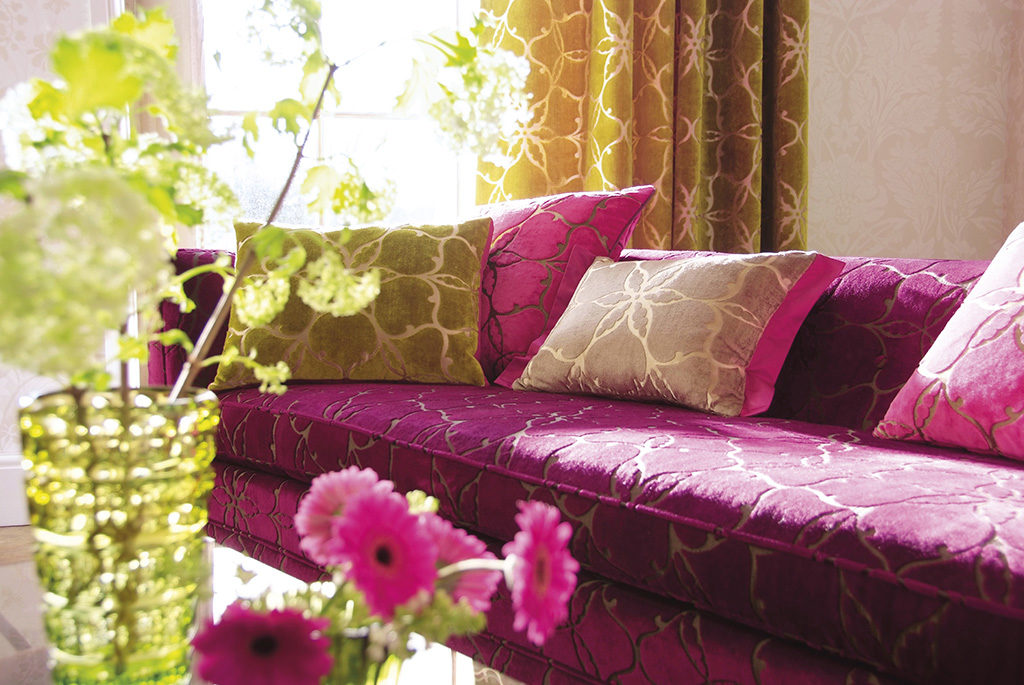
Common Pollutants Found Inside Buildings
When you think about indoor air pollutants, you may think about things like animal dander, dust and perhaps mold spores. These are commonly associated with dirty air ducts, and you may believe that you can remove the pollutants by simply replacing your air filters in your HVAC system and keeping your air ducts clean. However, there are other common pollutants found in modern homes and commercial buildings today. For example, tobacco smoke, chemicals from furnishings and cabinetry, chemicals from carpeting and flooring, radon, combustion gases from cooking and pesticides are just a few of the many types of pollutants that you and your loved ones may be exposed to on a regular basis inside your home. These can cause immediate health issues, and some can cause serious and even fatal health issues.
Why This is a Growing Problem
In previous decades and centuries, buildings were not designed with peak energy efficiency in mind. While they offered protection from the elements, many were drafty and allowed more air to circulate between the indoor and outdoor environment. Today's modern structures are well-sealed, and this means that more of the pollutants that are found or even created inside a building remain in this area. In some cases, it is estimated that indoor air quality may be considerably more polluted than outdoor air. Opening windows from time to time to allow fresh air into the structure is a great idea, but this alone is not the only step that you need to take to create a healthier indoor environment in your building.
Purifying Your Indoor Air
The United States Environmental Protection Agency, or EPA, has released a statement that indicates that eliminated chemical emissions inside a home or building are the best way to effectively improve indoor air quality. Laws at the local, state and federal level generally do not regulate emissions from products, but many environmental agencies and public health organizations have released information and recommendations regarding minimal exposure levels for various products that create pollutants. You may consider becoming more aware of how your flooring, clothing, furniture, cleaning products, paint and even the materials used to construct the building can impact air quality in the building. Knowledge is essential in combating air pollution. Bryant air purification equipment may be used to reduce the pollutants that you cannot eliminate through improved product choices.
Why Air Purification Equipment Can Be Beneficial
Volatile Organic Compounds, which are also known as VOCs, are one of the most common types of air pollutants to cause immediate health symptoms in people of all ages. There are various types of VOCs, and the individual's length of time exposed to the pollutant, individual health status and overall type of exposure may impact the severity and type of symptoms. In addition, conditions inside the structure, such as temperature, humidity, type of ventilation system and the overall age of the building can also play a role in the type and severity of symptoms. Some of the more immediate health symptoms that individuals exposed to VOCs may experience include:
- Headaches, dizziness or general confusion
- Irritation in the throat, nose, and eyes
- Rashes or other allergic skin responses
- Respiratory difficulties
- Stomach upset, including vomiting or nausea
- Fatigue
- Coordination issues
- Nosebleeds
When exposed to VOCs over a longer period of time or on a regular basis, additional health issues may be a concern. Some of the long-term or chronic health concerns associated with exposure to VOCs include
- Heart, kidney or liver damage
- Central nervous system issues
- Various types of cancer
In addition to these concerns, those who are exposed to VOCs as well as mold spores through indoor air pollution may also be at an increased risk for developing respiratory diseases or for existing respiratory conditions worsening. Some of these issues may be permanent and may continue to plague the individual even when the pollutants are removed from the environment. Some of these include:
- Asthma
- Hay fever or allergies
- Hypersensitivity pneumonitis
Health Concerns Resulting From Exposure to Mold
Mold spores are commonly found in residential and commercial structures as well, and exposure to mold may have acute or immediate health responses. Some issues may persist with a long-term impact on health. Mold exposure may result in:
- Headaches
- Concentration and memory issues
- Throat, nose and eye irritation
The mold exposure symptoms are often referred to as sick building syndrome. The acute symptoms may improve when the individual is removed from the environment or when indoor air quality improves. However, exposure to mold may cause flare-ups with existing chronic conditions, including allergies, asthma and more.
It is important to learn more about your property's indoor air quality and to take steps to purify and clean the air as needed. Call or Text us today for more details (941) 203-7955 and don't forget to check out our specials, financing, and rent-to-own options.
